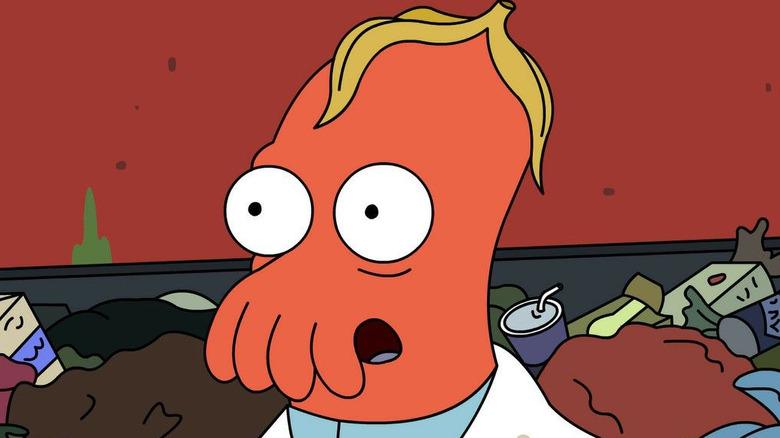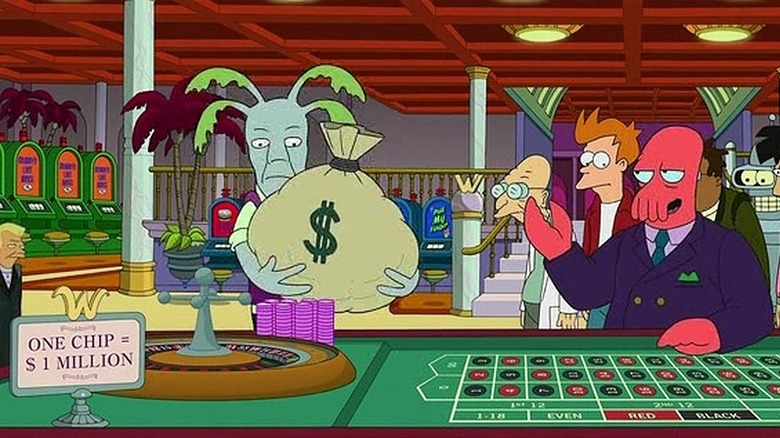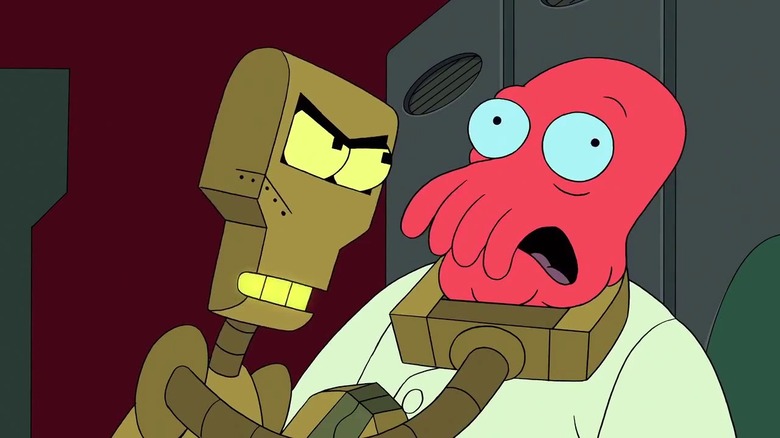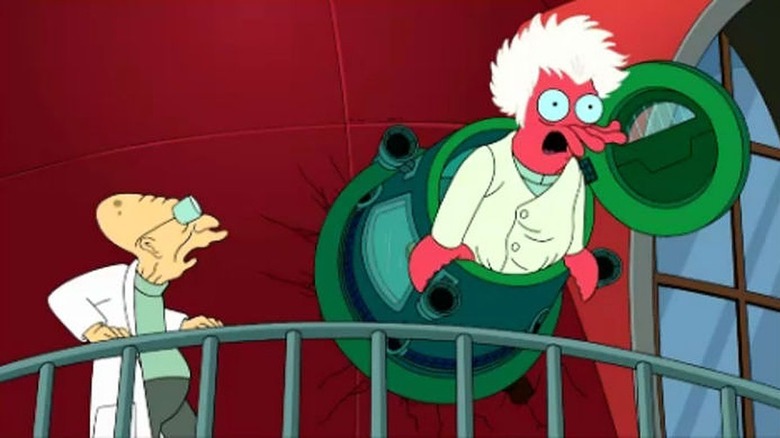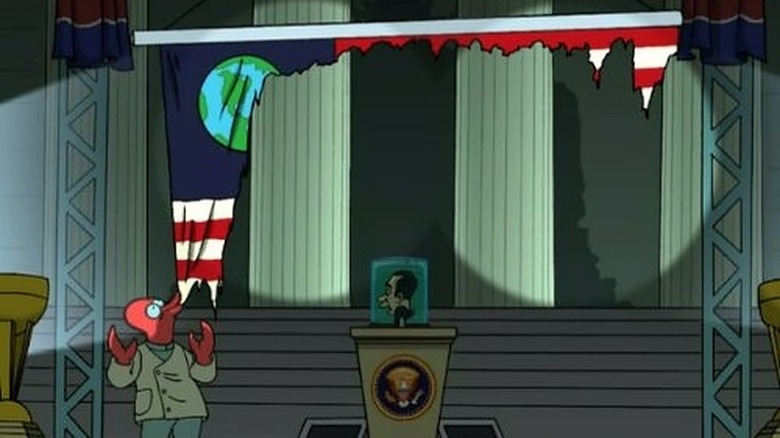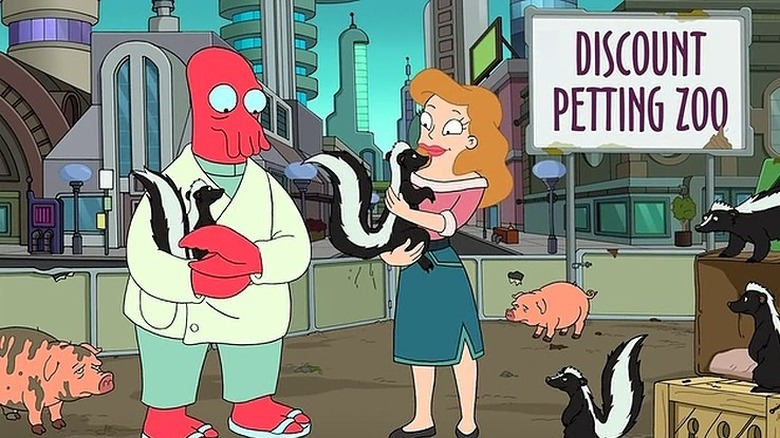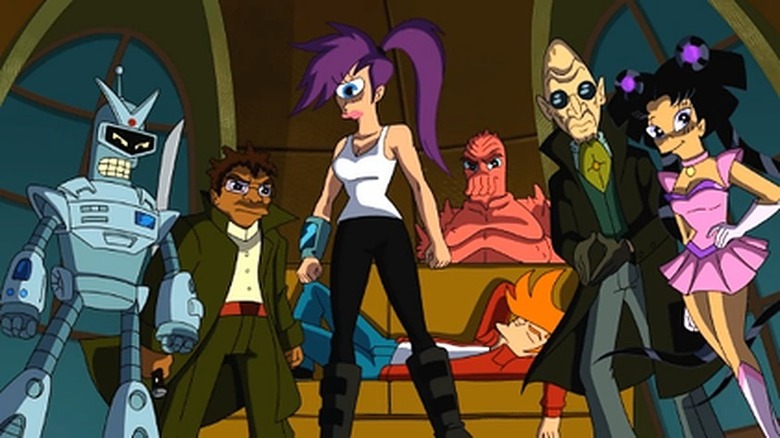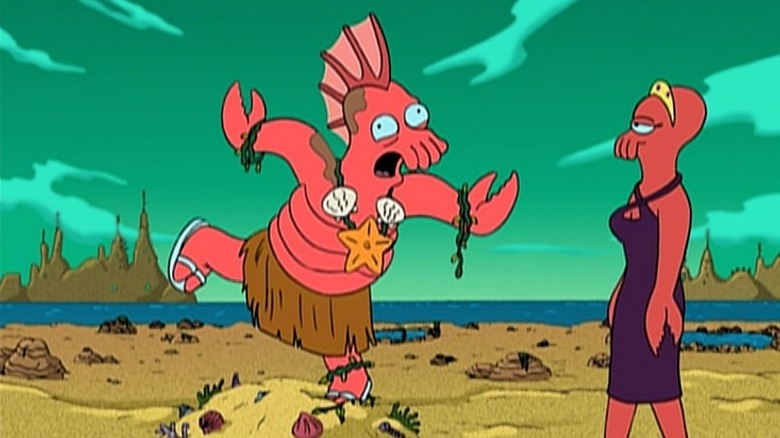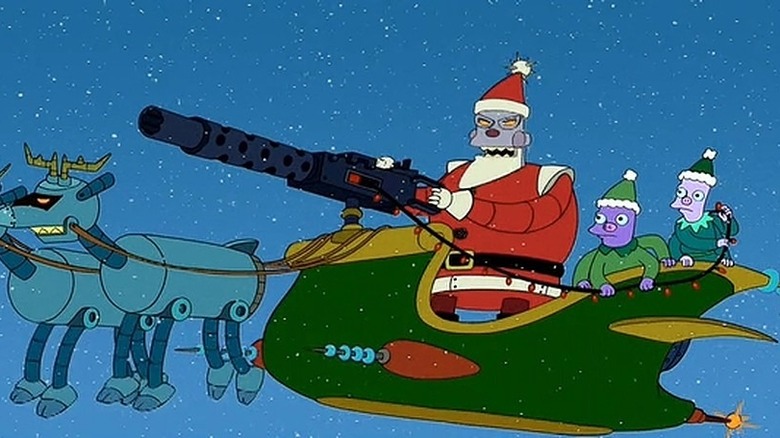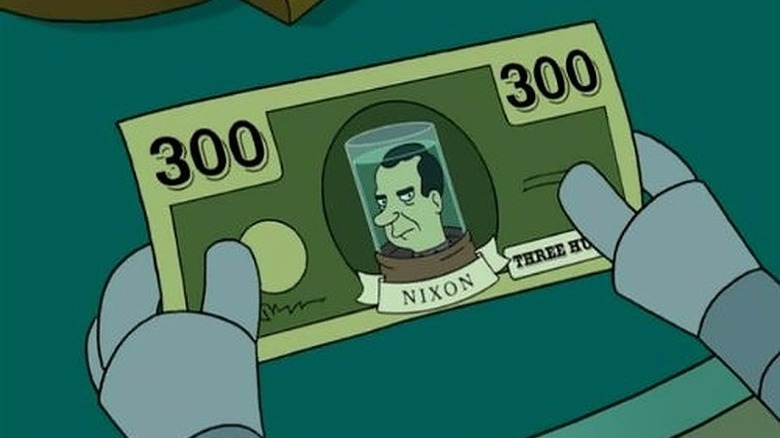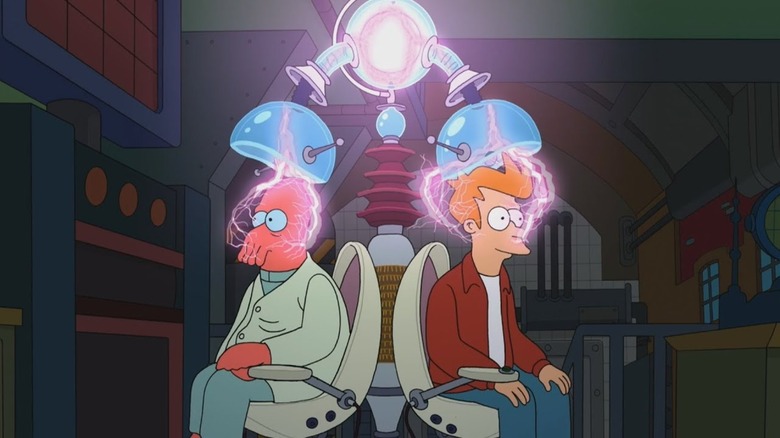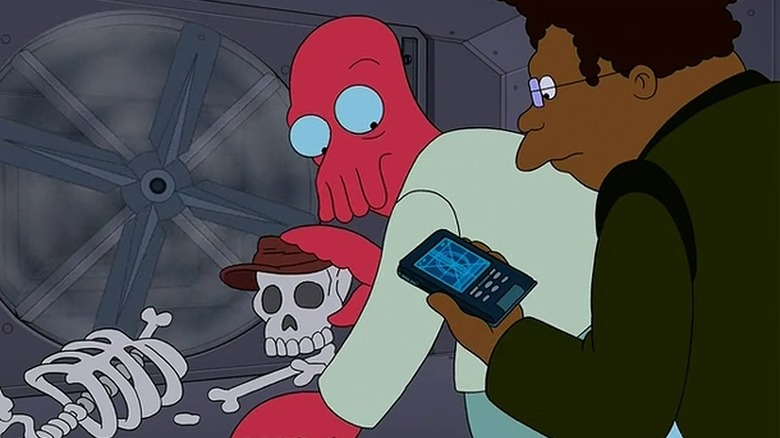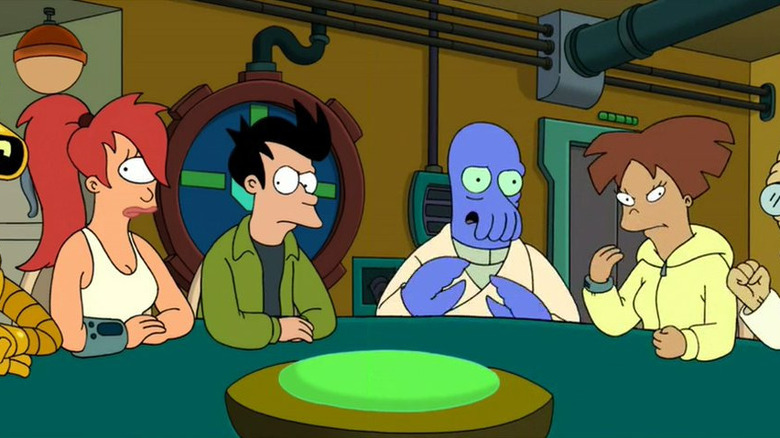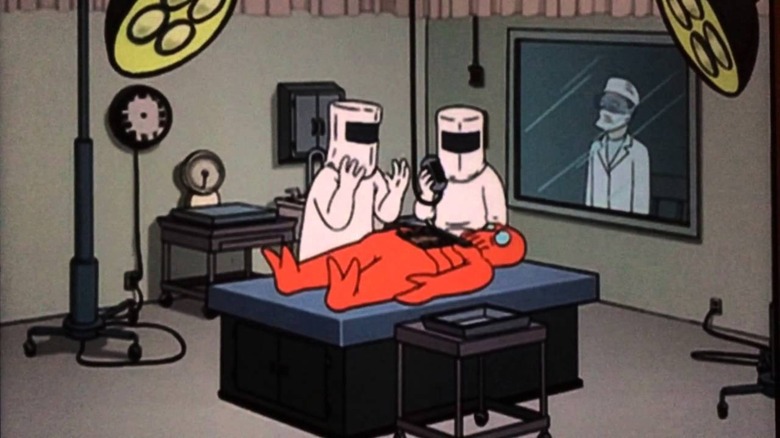The Best Zoidberg Episodes Of Futurama
He claims that his medical license was lost in a volcano, but his questionable ethics and inadequate understanding of human anatomy suggest that he never actually had the proper credentials in the first place. He once ate a hat dipped in barbecue sauce — and that's among the least disgusting of his meals. He can't tell (or doesn't care about) the difference between toenail clippings and potato chips: "A feast is a feast," after all. He is Doctor (we think) John A. Zoidberg, and he is undoubtedly one of the most memorable parts of "Futurama."
Some of Zoidberg's best moments come completely out of the blue, sandwiched between larger plot points that revolve around other characters. But sometimes, we get treated (or subjected, if you shares Hermes' point of view) to an episode that puts Zoidberg front and center, in all his crusty Decapodian glory. Not only is Zoidberg a treat, many of the episodes that star him rank among the all-time best episodes of "Futurama." In celebration of the good (ish) doctor, we present the very best Zoidberg-centric episodes, exoskeleton and all.
Viva Mars Vegas
What happens in Vegas stays in Vegas ... unless it's one of the best Zoidberg storylines in Futurama, in which case it must be rewatched. Indeed, fans love Season 7's "Viva Mars Vegas" and all its casino craziness.
One of Dr. Zoidberg's defining characteristics is his fraught relationship with money. In contrast to the affluence and unquestioning respect enjoyed by doctors in modern society, Zoidberg's rampant incompetence keeps him in a constant state of poverty. Coupled with the fact that he has a poor understanding of human currency (he's just as impressed by small sums of money as he is by millions of dollars), he's pretty much never in a stable place financially.
The good news is, Zoidberg doesn't know or care enough to be bothered by this. That means he's constantly getting himself into various degrees of trouble, much to our amusement. In "Viva Mars Vegas," we see him accidentally come into $8 million, then gamble it all away. He's completely unbothered by this — possibly because he doesn't understand what a gargantuan sum of money that is, or possibly because, as he explains, he had fun. So did we.
The Silence of the Clamps
Humans have worried for years that robots will one day take over. But did you know that Decapodians are not immune to the same fear? In the Season 6 episode "The Silence of the Clamps," we see the bright red Zoidberg turn green with jealousy when a robot threatens his gig.
While Zoidberg has myriad unique features, two of the most striking are his claws. So, when Robot Mafia member Clamps is sent to find Bender after the unscrupulous robot makes out with the Donbot's daughter, then testifies against the Donbot in court, Zoidberg is understandably threatened. Clamps, of course, derives his nickname from the giant clamps he has in place of hands. He uses them masterfully for everything from day-to-day activities to torture.
Zoidberg, on the other hand (no pun intended), has mostly made mistakes with his claws, rather than a name for himself. Nevertheless, his pincers are pretty much the only things that make him at all decent at his job. This episode marks one of the only times Zoidberg seems fully aware of his own incompetence, which is funny enough all on its own.
The Tip of the Zoidberg
Beneath his exoskeleton, Zoidberg is a gelatinous blob of flesh. The doctor's backstory is as opaque and shapeless as his form: Most of what we know comes from brief references to shady activities and unseemly characteristics, like the fact that one stage of his life cycle is a parasitic lamprey.
That all changes in Season 6's "The Tip of the Zoidberg." Like many Zoidberg episodes, this one kicks off due to the doctor's incompetence, which leads the Planet Express crew to demand he be fired. Of course, this begs the question of how in the world he ever landed the job in the first place. Flashbacks show us that Professor Farnsworth and Zoidberg befriended each other decades ago, and that Farnsworth saved Zoidberg's life.
Unfortunately, Farnsworth believes he contracted hyper-malaria during that excursion, which can either kill instantly or lie in wait for years before striking. Thus, all those years ago, he asked Zoidberg to kill him if he ever exhibits symptoms. Out of gratitude, the crustacean agreed, and that's why Farnsworth keeps him around.
A Taste of Freedom
There are a lot of things about humanity Zoidberg finds difficult to understand: Money, anatomy, edible vs. inedible foods. In Season 5's "A Taste of Freedom," the clueless alien faces his greatest challenge in comprehension yet — the concept of freedom.
On Freedom Day, the people of Earth celebrate what amounts to a comedic and animated version of "The Purge:" The public is free to do whatever they want without consequences. Zoidberg loves this holiday, since freedom isn't something that exists on his home planet. Of course, if anyone is going to serve as the exception to a good time, it's Zoidberg. In what he sees as an expression of his freedom, he eats the historic flag that symbolizes the holiday. The inhabitants of Earth see this as treachery. Zoidberg is put on trial and sentenced to death, which leads the Decapodian embassy to summon their military to take over the Earth. Now no one gets freedom!
It's all absurd, but that's pretty standard for Zoidberg. Happily, the episode ends on a nice note, with Zoidberg realizing Earth is his true home.
Stench and Stenchibility
Zoidberg's many bizarre characteristics make perfect fodder for out-there episodes. When you read the title of Season 7's "Stench and Stenchibility," you know that it couldn't be about any other character. In this episode, Zoidberg finally gets lucky in love. As evidenced by Season 2's "Why Must I Be A Crustacean In Love?," Zoidberg's awkwardness and odd features make it hard to find romantic success. But all that changes when he meets a woman named Marianne who, fortuitously, has no sense of smell.
The creators of "Futurama" really did wait until the last possible moment to give Zoidberg a happy ending — "Stench and Stenchibility" is the penultimate episode of the series. But it is a truly meaningful one. While his relationship with Marianne, a flower merchant, owes its initial success to her inability to smell, Zoidberg eventually performs the selfless act of giving her a nose transplant so that she can finally smell flowers.
What happens next is a testament to the power of love: You see what you want to see and you smell what you want to smell when you're with the right person. Having never become acclimated to the smells of the world and thus not knowing which smells are "good" or "bad," Marianne finds herself repulsed by flowers and attracted to Zoidberg's scent, all because she's in love with him. Awwwww.
Reincarnation
Futurama has an uncanny way of tackling hard philosophical concepts with such nonchalance and humor that the audience doesn't even notice the existential crisis until they've laughed their way halfway through it. With Stephen Hawking as a guest star, this tendency manifests in full force in the Season 6 finale, "Reincarnation."
Uniquely, "Reincarnation" reimagines the Planet Express crew through the lens of three different animation styles. The departures don't stop there: Though Zoidberg usually sparks stories by causing a catastrophe, in the third segment of "Reincarnation," it is Zoidberg who is responsible for bringing peace to a confrontational situation. How does he do this, you ask? He sheds his exoskeleton and performs a dance.
You might not think of Zoidberg as the kind of guy who has "moves." Indeed, when Zoidberg is first observed shedding his shell, the Planet Express crew beg him to stop wiggling around. But in the final segment of "Reincarnation," this odd dance is a literal life-saver.
Why Must I Be A Crustacean In Love?
There aren't a lot of romantic storylines for Zoidberg in "Futurama." And when he does get a hint of romance, it usually comes with a sizable dose of misfortune. In Season 2's "Why Must I Be A Crustacean In Love?," this misfortune spreads to the audience, who are forced to witness Zoidberg and fellow members of his species during their mating season. As it turns out, however, this is what makes for one of the most popular Zoidberg episodes around.
The mating ritual of the Decapodians involves erecting a mound on a beach, dressing up in seaweed, and performing an awkward dance atop the mound in the hopes of attracting a mate. It's about as successful as you might expect for Zoidberg, and the spurned doctor leaves the mating ground discouraged.
Zoidberg's character offers a whole lot of schadenfreude — who doesn't love to watch his foibles and mishaps go down? But as it turns out, Zoidberg is lucky to be left on the shelf by the females of his species: Decapodians perish after mating. Because he's undesirable, we still get to have him around.
Xmas Story
Season 2's "Xmas Story" isn't exclusively about Zoidberg, but it does end with him saving the day. Plus, it contains the very surprising suggestion that Zoidberg is one of the few upstanding creatures on the planet.
Christmas in the future isn't Christmas at all: It's Xmas, and Santa is a terrifying robot who murders anyone he deems naughty. In Robot Santa's view, everyone on the Planet Express crew (and most of the people on the planet, in fact) have been very naughty, and thus deserve death ... except Zoidberg. Zoidberg, apparently, has met Santa's standards, and gets a pogo stick for Xmas.
There is, of course, no real explanation for this — it's simply yet another absurd "Futurama" tidbit that shakes up our preconceived notions about the characters. But the judgment of the robotic Santa Claus is not to be questioned! It is with his shiny new pogo stick that Zoidberg performs the noblest (in our eyes) or naughtiest (in Santa's eyes) act of all: Cutting the wires to the Christmas lights, thus electrocuting Santa and saving everyone's lives. Now that's a holiday special.
Three Hundred Big Boys
As unforgiving a light as Zoidberg is normally cast within, most of his unseemly qualities aren't things we can really blame him for. Indeed, with the exception of Hermes, most of the Planet Express crew harbor a degree of affection for him. Season 4's "Three Hundred Big Boys" extends an invitation to the audience to feel that fondness too.
On display this time are, once again, Zoidberg's confusion about money and his purposefully unspecified housing situation. We see him let the thrill of "wealth" (which he mistakenly believes he's attained in the form of a $300 tax rebate) go to his head, making him forget his friends and attempt to "live large," under the assumption that he is set for life.
When he realizes that he can't live off the $300 forever, he decides to do something pretty wholesome instead: He buys a meal for a group of people experiencing homelessness. This is, of course, an experience Zoidberg can relate to — it's often implied that when he isn't at work, he doesn't have a place to live. We've seen him take up "residence" in a number of odd places over the seasons, including Leela's punching bag. It's a great gag, but in "Three Hundred Big Ones," it also makes for a genuinely sweet moment.
The Prisoner of Benda
It's hard to do an original take on a body-switching episode — this old trope has been used in both live-action and animated TV productions for many, many years. But "Futurama" is no ordinary sitcom. Season 6's "The Prisoner of Benda" uses the body-switching premise to stuff in as many gags as possible, with some particularly delightful ones at Zoidberg's expense.
It all starts when Professor Farnsworth switches consciousnesses with Amy, in an attempt to relive his youth. Naturally, the entire gang proceeds to take advantage of the invention that makes this possible. Leela switches bodies with Amy (which means she enters Farnsworth's body) in order to repulse Fry and prove to him that he only likes her for her looks. Fry determines that he must beat her at her own game, so he switches bodies with Zoidberg.
This is, of course, an elaborate diss of Zoidberg — he's the immediate choice when a repulsive body is called for. But it's undeniably hilarious to watch Fry attempt to one-up Leela over the course of dinner in Zoidberg's body, and equally funny to watch Zoidberg adapt so poorly to normal human life in Fry's body that he blows up Bender's apartment.
Murder on the Planet Express
"Futurama" might be an animated science fiction sitcom, but it's definitely more fiction than science. In Season 7's "Murder on the Planet Express," the show wears its favorite stories on its sleeve by parodying two of the greatest sci-fi movies ever made: 1979's "Alien" and 1982's "The Thing."
Following the theme of Zoidberg not really having a defined place to live, we find out in this episode that he's been living in Leela's punching bag. This centers an interesting point about Zoidberg's character that's hinted at throughout the series: Maybe Zoidberg isn't pathetic. No, hear us out. The guy is willing to literally live out his life as a punching bag. He doesn't need a home, isn't concerned with keeping or losing money, and (delusionally or not) believes the best about his "friends" and colleagues. He cares for them in his own way, and remains oblivious, most of the time, to their distaste for him.
Maybe, just maybe, Zoidberg is only "unfortunate" by human standards. Sure, he sometimes laments his romantic lucklessness, but his failure to mate also saves his life. He's a loser by human standards, but if those aren't the standards he himself holds, can we say he's a loser at all? Is Zoidberg not, in fact, downright admirable, and perhaps even cool, for not caring one whit about what other people think of his life?
The Farnsworth Parabox
One of the best things about "Futurama" is that anything can happen. Case in point: The characters die and come back to life multiple times, through the power of science (and more importantly, suspension of disbelief). This place between mortality and immortality is often reached with the help of parallel universes — which, unlike much of the show, are more science than fiction.
The parallel universe spotlighted in the Season 4 episode "The Farnsworth Parabox" offers us the only thing better (or worse) than one Zoidberg: Two Zoidbergs, who quite literally steal the show. Seriously, they steal a box containing the original "Futurama" universe, leading to a chase that spans multiple alternate dimensions.
One of the best parts about this episode is that, once again, we get to watch Zoidberg ruin things. But refreshingly, the show always figures out how to show us that spectacle in a new way — or, in this case, on a new scale.
Roswell That Ends Well
Season 3's "Roswell That Ends Well" isn't just one of the best Zoidberg episodes of "Futurama," it's one of the best episodes of the entire series. It also references one of conspiracy theorists' favorite parts of American history: The rumored 1947 alien landing at Roswell, New Mexico. Perhaps most importantly, however, it teaches us a lesson about not microwaving metal.
In this episode, we see stark evidence of Zoidberg's high tolerance for pain. After Fry puts metal in the microwave, he produces radiation that interacts with the particles expelled by a supernova, sending the crew back to 1947. Naturally, the Planet Express crash-lands in Roswell, New Mexico. Zoidberg is captured by the U.S. military and subjected to experimentation, including a dissection. Yet he remains conscious and doesn't require anesthetic, implying he must be pretty darn impervious to pain.
"Futurama" plays around with time quite frequently, explaining and even shaping past events from 1,000 years in the future. Designating Zoidberg as the alien that landed at Roswell, making the place famous, is a beautiful addition to his story — and our history.
